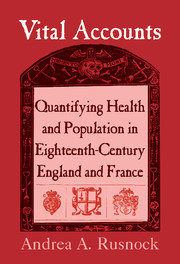Book contents
- Frontmatter
- Contents
- List of Illustrations
- Acknowledgments
- Vital Accounts
- Introduction
- 1 A New Science: Political Arithmetic
- PART ONE SMALLPOX INOCULATION AND MEDICAL ARITHMETIC
- 2 A Measure of Safety: English Debates over Inoculation in the 1720s
- 3 The Limits of Calculation: French Debates over Inoculation in the 1760s
- 4 Charitable Calculations: English Debates over the Inoculation of the Urban Poor, 1750–1800
- PART TWO MEDICAL ARITHMETIC AND ENVIRONMENTAL MEDICINE
- PART THREE POLITICAL ARITHMETIC
- Conclusion
- Bibliography
- Index
- Titles in the series
3 - The Limits of Calculation: French Debates over Inoculation in the 1760s
Published online by Cambridge University Press: 15 October 2009
- Frontmatter
- Contents
- List of Illustrations
- Acknowledgments
- Vital Accounts
- Introduction
- 1 A New Science: Political Arithmetic
- PART ONE SMALLPOX INOCULATION AND MEDICAL ARITHMETIC
- 2 A Measure of Safety: English Debates over Inoculation in the 1720s
- 3 The Limits of Calculation: French Debates over Inoculation in the 1760s
- 4 Charitable Calculations: English Debates over the Inoculation of the Urban Poor, 1750–1800
- PART TWO MEDICAL ARITHMETIC AND ENVIRONMENTAL MEDICINE
- PART THREE POLITICAL ARITHMETIC
- Conclusion
- Bibliography
- Index
- Titles in the series
Summary
It is not therefore a question here of moral philosophy or theology, it is a matter of calculation: let us avoid making a case of conscience out of a problem of arithmetic.
Charles-Marie de La Condamine (1754)In vain the savants persuade themselves of the utility of inoculation. There must be a general conviction for this method to be established.
Jean-Antoine Butini (1752)In his letter on inoculation (1733), Voltaire noted that the “Christian countries of Europe” considered the English “Fools and Madmen. Fools, because they give their Children the small-pox to prevent their catching it; and Mad-men, because they wantonly communicate a certain and dreadful Distemper to their Children, merely to prevent an uncertain Evil.” The English, on the other hand, he continued, “call the rest of the Europeans cowardly and unnatural. Cowardly, because they are afraid of putting their Children to a little Pain; unnatural, because they expose them to die one Time or other of the Small-pox.” This wide gulf separating English and French views of inoculation was not bridged until late in the eighteenth century, when the death of Louis XV from smallpox in 1774 silenced most opponents. This is not to say that there were no individuals who promoted inoculation in France – many of the philosophes were outspoken advocates. Voltaire's letter on inoculation, wedged between his letters on English government and the English philosophers Bacon, Newton, and Locke, literally placed inoculation on the agenda of enlightened subjects and, at the same time, cemented its association with the English.
- Type
- Chapter
- Information
- Vital AccountsQuantifying Health and Population in Eighteenth-Century England and France, pp. 71 - 91Publisher: Cambridge University PressPrint publication year: 2002

